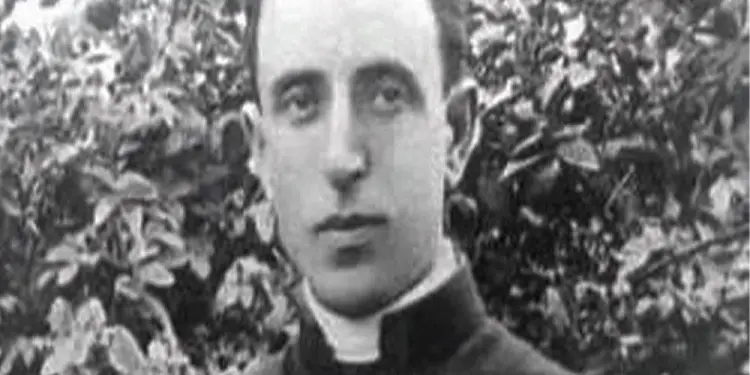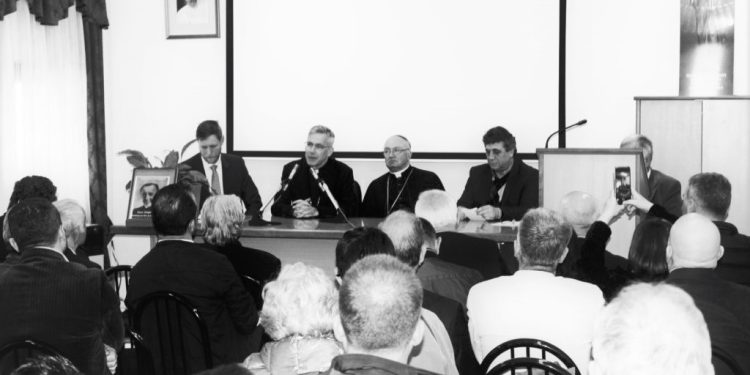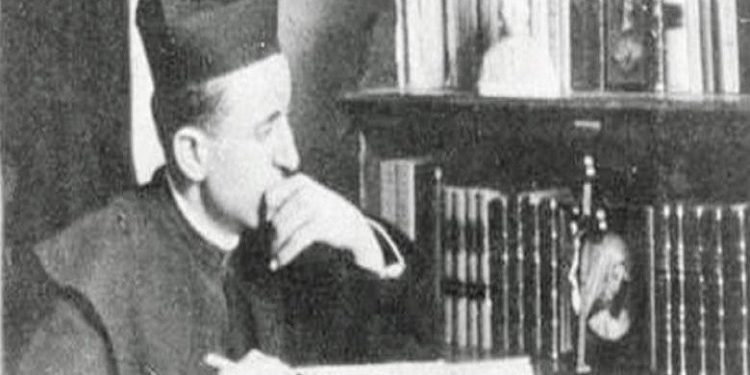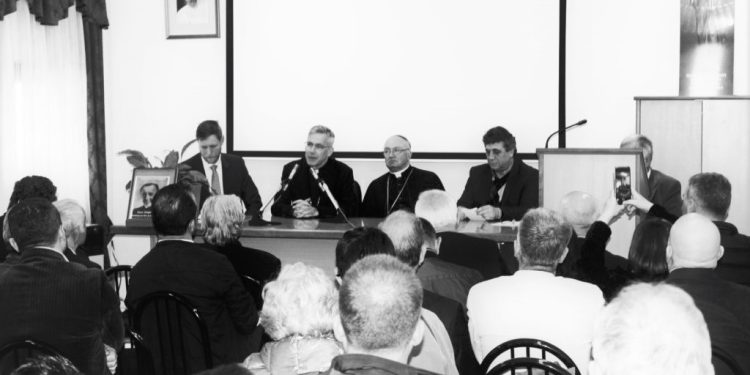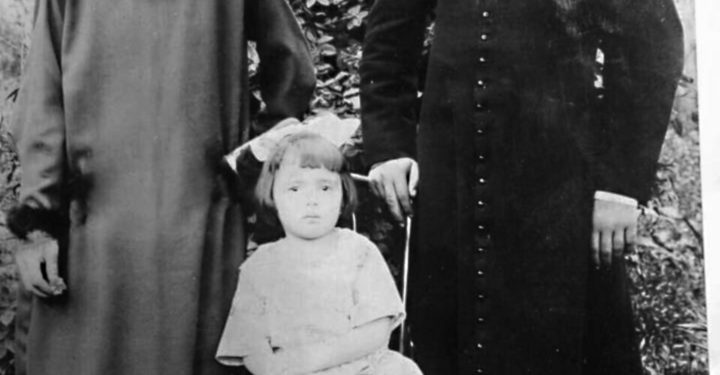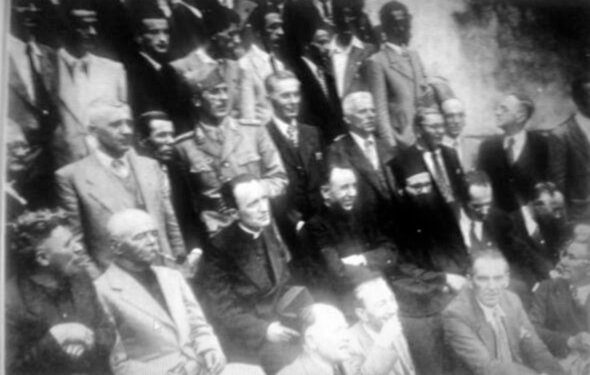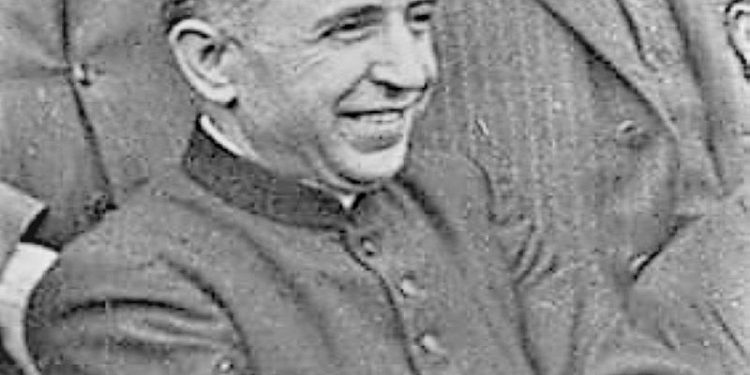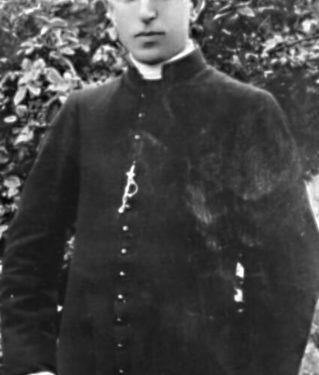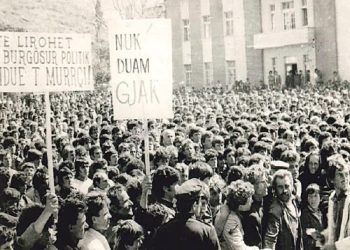NIKOLLË LOKA
Av. ALFDRED DUKA
NIKOLIN KURTI
Part eleven
WHY DOES THE POLITICAL ACCUSATION OF COLLABORATION NOT STAND?
-Continuing the tradition of native Catholic clergy –
Continues from last issue
Cooperation for the state and only in its interest
Memorie.al / Representatives of allied missions had gone to Dom Shtjefni’s house. For them, the Catholic Church was in opposition to the communists, and they were interested in learning something about the creation of the opposition in the country, while the country was facing rapid social transformations. On the part of Dom Shtjefni, these visits were seen as an opportunity to inform the representatives of the allies about the persecution that was being done to the Church. If he did something more, with the information he gave to the representatives of the allied missions, it does not mean that he was thinking radical forms against the state.
As far as he had learned from his interlocutors, Dom Shtjefni expected free elections and democratic changes in the country.
Cleric Kurti tells him about the visits made by the representatives of the allied missions: “General Hudson, of the English mission, came to my house once, for the first time a few days before Roosevelt’s death…! He came after lunch accompanied by a colonel or major. After they came to my house, General Hudgson asked us in French, how open the Diocese of Durrës was, have you been to Enver, how are you doing with the government, he finally said to Archbishop Vincens Prendush: I will go visit you from South and then from the North and Shkodra and after I return I want to meet them again”.
“A month before General Hudson came to my house, Colonel Palmer and Major Smith of the English mission came…during the conversation they asked me if I had complaints from the government in force, I told them I complain that they did not notify us always when the condemned were executed so that we could perform the religious service for them. They asked me how we were doing in terms of the economic situation and I answered that we were doing “easy”. Palmeri told me that they complained against us, a part of the Zozists and Ballista Albanians, that we were communists. Palmeri continued to say, again we have called them (zogists and ballistas) with cooperation, but they did not want to….”! “…….And he also asked me how we were doing with the government, did I know Enver and asked about religious functions……………”.
Kurti also met with the Representative of the American Mission Jakobs and the French Major Vizdrav, where the conversations had the same familiar character. The Parish Priest had returned all visits to foreign representatives. He went to the English Mission together with Archbishop Prenushi, while to the other missions, he went alone. During the short visits, which lasted only a few minutes, the conversations had a general familiar character and the cleric Kurti did not make any political commitment to the interlocutors. Don Shtjefni was accused of having compiled a memorandum that he had sent to foreign missions, signed by him and Anton Dukagjin, in support of the Central Committee of the ‘Resistance Group’. He is accused of: “showing he ready to create an armed detachment of 4,000 people, to cause disorder in the country. Then with Anglo-American military help, to overthrow the popular power”.
Regarding this accusation, Kurti explains: “In this year’s Kallnuer, I took a letter to the American and English mission, who was compiled by Anton Dukagjini and I at my home. I typed this letter on my typewriter and made three copies: one for the American mission, one for the English mission, and one we kept for ourselves. This letter contained a long report on the condition of the fugitives of the North, stating how many fugitives there were, who was the chief, how much strength each had, what weapons they possessed, and what other weapons they needed, then told where the economic situation and for clothing suffer, it showed that the fugitives were related to each other and were about to explode the uprising….!
From the names mentioned in the report, I remember: Muharrem Bajraktar, Pashuk Biba, Mark Gjon Markun, etc.,………………! For Shkodër, the report indicated that he was inside illegally: Ejup Kazazi, Maliq Bushati, Hamdi Isufi and another that I don’t remember. The report finally concluded, requesting that: “the Anglo-Americans set a point of view to meet with a delegation of fugitives.” We send these letters to the English and American mission, with the help of Rrok Oboti”. Shtjefni replied that Anton Dukagjini had told him that there was a committee here in Tirana and a committee in Shkodër, but he had not told him the people who were part of them. Dom Shtjefni himself had not made any commitment to armed activity and the 4,000 armed men, he had written in the letter sent to the allied missions, as the forces of Muharrem Bajraktar.
“Two weeks after sending the report to the Anglo-American missions, Anton Dukagjini came to my house to sing me a letter in French, which he told me, would be sent to the Anglo-Americans by a central political committee, against the government that was here in Tirana”. “With Sami Qeribaş personally, I have not had a meeting, but I was connected with him through Anton Dukagjin and through him he tried very hard to fill my mind to participate in this Committee, telling me that it is a party supported by Anglo- the Americans, who help him. So I, relying on these words, at first participated, cooperating with him in the compilation of the first two letters, which were similar reports regarding the fugitives….”.
In relation to this accusation, the defense lawyer also intervened: “Shtjefën Kurti learned about the creation of that organization, but he was not an effective member and leader of the organization. When a member of the organization makes an effort to recruit someone, he tells them something from the organization where he will recruit him, and the one who finds out, should not necessarily denounce that organization.”
Kurti was accused of currency trafficking, being specified in this accusation that his salary for the alleged espionage services was equal to that of the ministers of the communist government.
According to his depositions to the investigator, the money had been given to him by the Apostolic Nuncio to subsidize the parishioners of the South and to protect it from seizure; he had sent it to the Servite Sisters. From there he had drawn them through Nush Prendi, a former policeman, against a reward. In relation to this accusation, the defense lawyer also intervened: “The foreign currencies were to be used to help the priests of the South, and Dom Shtjefni did not intend to use them for himself.” Shtjefën Kurti had been active within the laws of that time, committing to a better representation of Catholics in the future government, which he thought would be pluralistic, therefore he supported the idea of creating the Christian Democratic Party. He had also affirmed in the investigator: “Two or three weeks before the electoral elections of December 2, we gathered at the House of Jesuits ‘Rruga e Kavaja’: myself Shtjefën Kurti, Pjetër Meshkalla, Father Gjadri, Father Gjon Karma, Father Pashko Prela and two Italian priests.
We held this meeting to discuss whether we, the Catholic Clergy of Tirana, would vote or not…………….I provoked this meeting and announced that in the morning after lunch of this day, we would hold the meeting….! Sometime before the elections, Nush Radovani came to my house, accompanied by a friend of his that I don’t remember. After sitting for a while, he said: “How did we Catholics remain like this, without a party of our own”?! I asked him for what party? He told me about a Christian Democratic Party and I approved his opinion, but I told him that it is late, that it is not more than 4-5 days from the day of voting, so we do not have time to prepare, but I told you, you better think hard about the next elections….!
Although in the investigative process, when he had spoken about the meeting with the Representative of the French Mission, Dom Stephen had affirmed that he had sent four letters to the Vatican, the first through the Nuncio Nigris and the other three with the representatives of the Mission of France; his deposition in this case, went unnoticed. Kurti himself had emphasized that: sending letters to the Vatican had been a practice used by all clerics, but not all of them had received an answer, as had happened to him.
Prosecutor’s claim
On April 16, the Prosecutor submitted the claim and requested 18 years of imprisonment, forced labor and the loss of civil rights for 5 years.
THE PEOPLE’S REPUBLIC OF ALBANIA
THE MILITARY PROSECUTOR’S OFFICE OF THE GARRISON OF TIRANA
V.F.L.F
No. 209 REG.THEM.
Requirement
MILITARY COURT OF THE GARRISON OF TIRANA
Here
Otherwise, it will be ascertained from the minutes kept by the State Security Section in Tirana, which are attached, the defendant Don Shtjefën Kurti, son of Jaku and Katerina, aged __ from Prizrendi and resident in Tirana, with a religious profession , arrested on _________ is accused of:
During the occupation, he was Jakomon’s agent and collaborated against the movement of N. Çl.
He was a leading member and organizer of Sami Qeribashi’s fascist terrorist organization, where he acted as a liaison between it and the Demo-Christian organization in Shkodër, with the fugitive criminals of the North, with Andon Dukagjini and with agents of foreign reaction.
He has acted as an agent of foreign reaction, helped them with espionage by handing over state secrets and incited foreign countries for armed intervention against the People’s Power.
He smuggled foreign currencies, hiding 3000 and some dollars, in order not to denounce them. – Since his guilt is foreseen as a punishable guilt by article 7,2,3 para. 8,9,10 of the law. 372, it is first necessary to judge.
Therefore:
I request his judgment based on Article 3, para. 5 of the Law. 372, on the part of this Court, and after the guilt of which he is accused is proved, his punishment should be imposed, based on the above articles.
Tirana, April 13, 1947
MILITARY PROSECUTOR OF THE GARRISON
CAPTAIN II (PETRIT HAKANI)
V.F.L.F
The word of defense from Av. Burhan Rusi
Mr. President
- Judge
Dear Accusation
The defendant, Dom Shtjefën Kurti, is brought here before you to give an account for his activities that he is accused of having developed during the time of the occupation and after its liberation. From an analysis of my minutes and from all the judicial process of the past sessions, the defense finds the following:
The Italian occupation of the defendant Dom Shtjefën Kurti is found here as the Chaplain of Tirana. At that time, by his superiors, he was appointed with the duty to perform religious services in the Church of the Jakomon Palace. So because of his religious mission, the defendant is personally acquainted with Jakomon. It was a fact that this defendant performed religious services for Jakomon and his family, which were scheduled once a week.
In relation to the first accusation, the question now arises that if the defendant Jakomon or his clique, in addition to the religious service, promised some other service and of a political character, what is the meaning of giving him information about the internal popular movement, on the current political situation, on the people of Lvivizje, etc. The defense has no facts in this regard.
The truth is that Dom Shtjefni was often visited by officers of the Lieutenancy, Captain Paci, Captain Kola, but it should be noted that these officers were Jakomon’s assistants. They were in charge and had a mission to accompany the defendant with the Palace car to the Palace Church, to perform the religious service. The defendant from Mëkëmbsi for his service, had a monthly salary of 500 fr. sh, this shows that they were given to him exclusively for religious service and not for any other service.
Here it was pointed out that Jakomoni also forgave the defendant a car, but this is true and we should not be surprised, since he also did such a thing to the communities of other religious sects, so the car Dom Stephen it was not an unusual thing.
As I presented above, Mr. the judge does not derive them only from the statements of the defendant, but also from those of Mark Rokoboti, who was the servant of the defendant, and therefore his statements must be trustworthy.
So Mr. judge, in relation to the first charge, it does not appear to me that the defendant has developed political activity in the direction of the charge.
For the second accusation, I say that there are some elements that charge the defendant with responsibility. It was established that the defendant from the mouth of Andon Dukagjini, has learned something in a concrete way that there is an anti-people’s organization here. The defendant learned this from Andon Dukagjini, who was doing his best to get the defendant into the mire where he himself had sunk.
The defendant was aware of the organization; this is where his guilt lies. But there are no concrete facts that the defendant was an effective member and leader of the terrorist organization in question. It is worth noting that the defendant did not know the heads of the organization nor its members, so how it possible to imply that is the defendant was an effective member of it?!
The experience of the previous processes has shown us that many people knew about the existence of this terrorist organization in Tirana, but that they were not part of it at all. This has happened precisely because one of the effective members to recruit other members has opened up to a friend or friends, telling them something abstract about the organization.
Some have entered it and some have refused, the latter have remained in the phase of becoming aware of the organization’s existence. In a similar case, I remember, we are also in the concrete case. It is worth noting that none of the members of this organization have made any attribution against the defendant and have stated that the defendant also took an active part in the organization.
The fault of the defendant in this case consists of not reporting to the competent authorities what he had learned about. Because it belongs to the third charge, Mr. the judge, the defendant was played by Anton Dukagjin who, taking advantage of the close friendship he had with the defendant; put him in this difficult situation. It was proven that the defendant typed a letter that Anton Dukagjini had received from the war criminals, in which a meeting point with the Anglo-American missions was requested and where their forces were also shown. The act itself constitutes a criminal offense, but in this case I want to emphasize that here, we are not talking about that famous memorandum, which was spoken during the special process in the “Nacional” cinema, here we are talking about another letter.
The defendant, therefore, typed the last letter and the list, which he returned to Anton Dukagjini, who, through Mark Rokoboti, sent them to the English. In fact, Mr. Judge, the defendant’s guilt consists in the help he gave to the perpetrator of the crime, and as a result, the punishment related to this charge must go parallel to the graduation of this guilt.
Regarding the last charge, as the defendant himself claimed, we are facing a non-declaration of foreign currencies. Of course, the defendant acted in contradiction with the relevant provisions, but something I want to emphasize is that, the defendant did not have any personal material benefit from his act, since the money was intended for the assistance of the priests of the South. The defendant acted like that, not to speculate or to sabotage.
In general, Mr. Judge, the defense is of the opinion that in relation to the first accusation, due to lack of evidence, the defendant should not be charged with criminal responsibility. Regarding the other charges, the defendant is partially guilty, but it should be noted that the defendant cut off his relationship with Anton Dukagjin since the day he typed the letter mentioned above, long before to arrest Anton Dukagjini and before Sami Çelibashi’s organization was discovered.
And since that day, the defendant categorically refused to become Anton Dukagjin’s tool, after he found that he had acted badly and told himself, enough up to now, that you have done something wrong. For such a retreat, he also advised his former employee, Mark Rokoboti. So the defendant, repenting in time and condemning his act, I remember that he deserves all the generic mitigating circumstances.
You have the last word, Mr. Judge, therefore the defense is asking you to give a lenient decision for this defendant. Memorie.al
Tirana, on 16-4-1947
The next issue follows




